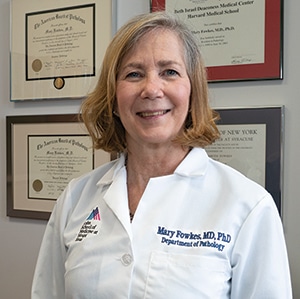Mary E. Fowkes, MD, PhD (1954–2020)
January 2021—Mary E. Fowkes, MD, PhD, a member of the CAP Board of Governors since 2019, died on Nov. 15, 2020.
Dr. Fowkes was an associate professor of pathology and the director of neuropathology and the autopsy service, Icahn School of Medicine at Mount Sinai Hospital. She was also an adjunct professor at the State University of New York College of Environmental Science and Forestry in Syracuse.
Dr. Fowkes served on many CAP committees and councils. She had been most recently appointed vice chair of the Council on Education and a member of the Council on Scientific Affairs and the Finance Committee. Dr. Fowkes was a former president of the New York State Society of Pathologists.
Kathryn T. Knight, MD, medical director of women’s health services and cytopathology, PathGroup, Nashville, met Dr. Fowkes after joining the CAP Federal and State Affairs Committee (FSAC) in 2004. “We’ve had a friendship that has lasted since that time,” she says, describing her friend as “incredibly committed and caring.”

Dr. Fowkes
(Photo: Mount Sinai Health System)
Dr. Fowkes was “absolutely passionate” about the value of the autopsy, Dr. Knight says, but her advocacy work at the federal and state levels went beyond the autopsy. When lawmakers in New York passed a bill banning pathologists from discussing laboratory and pathology test results with patients, “Mary was right there leading the charge to prevent that from taking place.”
“She was willing and able to participate whenever she could assist.”
Of Dr. Fowkes’ autopsy work, she says: “It’s telling that the things that she was so passionate about, this particular year, put her in front of the COVID-19 battle. From the beginning of the pandemic, she was out there doing autopsy after autopsy and helping us understand, as pathologists and as physicians, not only the initial impression of lung damage and the impact on the pulmonary system, but the multisystemic impact of COVID-19.”
In a 60 Minutes interview that aired a week after her death, Dr. Fowkes told interviewer Anderson Cooper that the autopsy was the most useful tool for learning how the virus affected patients. She described finding small and microscopic blood clots in the lungs, hearts, and livers—and significant blood clots and signs of stroke in the brains—of COVID-19 victims.
“She improved the opportunities for survival for patients, even in this relatively short period of time, simply by shining a light on what this disease was doing,” Dr. Knight says. “She put so much of herself into her efforts to help us understand the disease.”
“Here is someone who has steadily said, ‘The autopsy is necessary for us to understand disease, to understand treatment.’ And during the last period of her life, everything she has been preaching, so to speak, came to fruition and gave her this, in many ways, unwelcome platform, but nevertheless a platform to prove the point,” Dr. Knight says.
In her profile as candidate for the Board, Dr. Fowkes wrote: “If we do not protect our autopsies . . . we put our patients and our profession at risk. We need to embrace what we do and do it well, rather than let others take this essential tool for patient safety away from us.”
CAP secretary-treasurer Richard R. Gomez, MD, medical director, Baylor Scott & White Health, Dallas, met Dr. Fowkes in 2004 when they began serving together on the FSAC. “She became a close friend to me and my wife, Patsy,” says Dr. Gomez, who recalls her as “fun, energetic, knowledgeable, and a great listener” and as someone who liked adventure.
“I didn’t know her before then, but my wife, Patsy, and I certainly were positively affected by knowing her, and my life is better because of it.”
Dr. Gomez says Dr. Fowkes contributed to the diversity of practice on the Board of Governors. “She brought a sense of how it was working in the trenches in New York City, in her position, how hard and stressful it was sometimes, and what the Board and the CAP can do to help individuals in those situations.”
Wayne L. Garrett, DO, a member of the CAP Foundation Board of Directors who practices general surgical and cytopathology as a locum tenens pathologist, worked with Dr. Fowkes for 17 years on advocacy issues during terms on the FSAC and the CAP Political Action Committee. He says he was most struck by her “willingness to roll up her sleeves and do anything. She was one of those people you could always count on. If you had a project, you could call on Mary and she would help.”
Dr. Knight treasures the opportunity the CAP provides to meet and form friendships with others of diverse backgrounds. “I’m from the Deep South, and Mary was from New York, and on the face of it our backgrounds were very different,” she says. “But we found our commonalities in our commitment to this profession and in our experiences as moms.”
Dr. Fowkes often brought her daughter to CAP meetings, Dr. Knight says, and pre-pandemic she enjoyed visiting her son in Malta. “She tried to persuade me that we were all going and that we were going to retire to Malta, which sounded pretty fabulous to me. And I had hopes we were going to get there at some point together.”
“Everybody is special in their own way,” Dr. Gomez says. “Mary was special in many ways—as a physician, a mother, a friend, and a colleague. The world, not just the CAP, will miss her.”
“I hope she will be remembered as a truly terrific mom and a truly passionate professional,” Dr. Knight says.
In addition to her son and daughter, Dr. Fowkes is survived by her mother, two brothers, a sister-in-law, and a daughter-in-law.
—Amy Carpenter Aquino